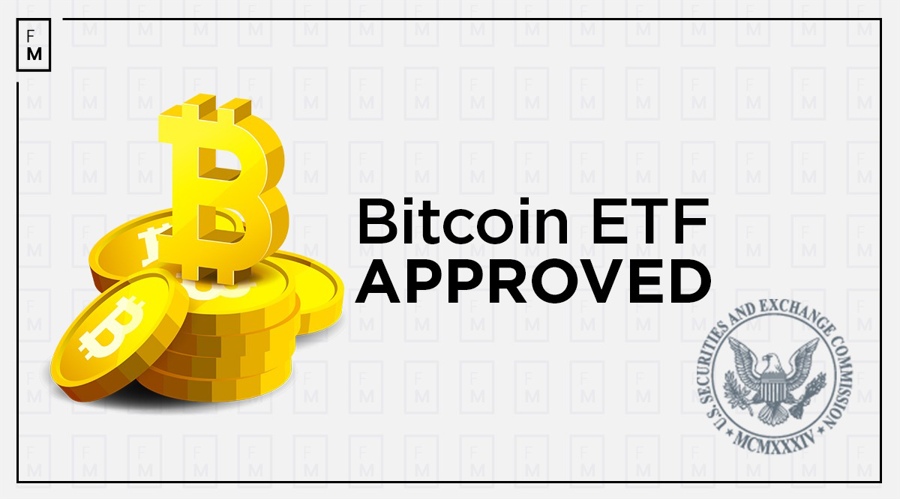
The stocks of the cryptocurrency exchange Coinbase
and Robinhood dropped following the recent approval of spot Bitcoin
exchange-traded funds (ETFs). According
to a report by CNBC, Coinbase experienced a decline of over 6% in its shares,
while Robinhood recorded a decrease of more than 3%.
The Securities and Exchange Commission’s (SEC) approval of
rule changes allowing the launch of spot Bitcoin ETFs marked a pivotal moment for the
cryptocurrency industry. This move, long-awaited by investors, signified a step
towards recognizing the credibility of cryptocurrencies.
Robinhood faced a dip in its stocks despite a surge of 56% in the previous year. The broader implications of the SEC’s approval of spot Bitcoin ETFs left
both major platforms evaluating their strategies in response to the changing
crypto landscape.
The impact is not limited to Coinbase, as Robinhood grapples with the aftermath of the SEC’s decision. Both platforms face the
challenge of adapting to a new financial landscape where ETFs could alter the dynamics
of cryptocurrency investments. Brian Armstrong, the CEO of Coinbase, has
acknowledged the significance of the decision by the SEC, emphasizing its
importance to the crypto industry.
As the custodian of choice for most spot Bitcoin ETFs approved by the SEC, Coinbase’s role remains crucial. However, the
potential downside lies in the spot Bitcoin ETFs diverting investors away from
Coinbase’s platform, creating a competitive landscape for the crypto giant.
Coinbase’s Role in Spot Bitcoin ETFs
Last July, Cboe amended its application to list spot Bitcoin ETFs to include
Coinbase as a surveillance-sharing partner (SSA). This move impacted spot Bitcoin
ETFs filed by notable entities such as Fidelity, VanEck, WisdomTree, Invesco,
Ark Invest, and 21Shares.
The crucial aspect of Cboe’s renewed approach lies
in its willingness to adopt the SSAs as recommended by the SEC. These
agreements act as a protection against potential fraud and market manipulation. These concerns have historically led to the rejection of spot Bitcoin ETFs by
the regulator.
SSA is a regulatory requirement outlined by the SEC,
necessitating a partnership between the party listing a spot Bitcoin ETF and a
spot exchange . The purpose is to ensure the timely sharing of information with
the regulator concerning any suspicious activities in the market.
On Wednesday, the SEC approved applications by 11 firms to list spot Bitcoin ETFs. This monumental decision marked a significant
shift in the cryptocurrency landscape.
The SEC’s approval encompassed major players in the
financial arena, including ARK 21Shares, Invesco Galaxy, VanEck, WisdomTree,
Fidelity, Valkyrie, BlackRock, Grayscale, Bitwise, Hashdex, and Franklin
Templeton. With the regulatory nod, these issuers can now list
their Bitcoin ETFs on NYSE Arca, Nasdaq, and Cboe BZX, potentially reshaping
the crypto investment landscape.
The stocks of the cryptocurrency exchange Coinbase
and Robinhood dropped following the recent approval of spot Bitcoin
exchange-traded funds (ETFs). According
to a report by CNBC, Coinbase experienced a decline of over 6% in its shares,
while Robinhood recorded a decrease of more than 3%.
The Securities and Exchange Commission’s (SEC) approval of
rule changes allowing the launch of spot Bitcoin ETFs marked a pivotal moment for the
cryptocurrency industry. This move, long-awaited by investors, signified a step
towards recognizing the credibility of cryptocurrencies.
Robinhood faced a dip in its stocks despite a surge of 56% in the previous year. The broader implications of the SEC’s approval of spot Bitcoin ETFs left
both major platforms evaluating their strategies in response to the changing
crypto landscape.
The impact is not limited to Coinbase, as Robinhood grapples with the aftermath of the SEC’s decision. Both platforms face the
challenge of adapting to a new financial landscape where ETFs could alter the dynamics
of cryptocurrency investments. Brian Armstrong, the CEO of Coinbase, has
acknowledged the significance of the decision by the SEC, emphasizing its
importance to the crypto industry.
As the custodian of choice for most spot Bitcoin ETFs approved by the SEC, Coinbase’s role remains crucial. However, the
potential downside lies in the spot Bitcoin ETFs diverting investors away from
Coinbase’s platform, creating a competitive landscape for the crypto giant.
Coinbase’s Role in Spot Bitcoin ETFs
Last July, Cboe amended its application to list spot Bitcoin ETFs to include
Coinbase as a surveillance-sharing partner (SSA). This move impacted spot Bitcoin
ETFs filed by notable entities such as Fidelity, VanEck, WisdomTree, Invesco,
Ark Invest, and 21Shares.
The crucial aspect of Cboe’s renewed approach lies
in its willingness to adopt the SSAs as recommended by the SEC. These
agreements act as a protection against potential fraud and market manipulation. These concerns have historically led to the rejection of spot Bitcoin ETFs by
the regulator.
SSA is a regulatory requirement outlined by the SEC,
necessitating a partnership between the party listing a spot Bitcoin ETF and a
spot exchange . The purpose is to ensure the timely sharing of information with
the regulator concerning any suspicious activities in the market.
On Wednesday, the SEC approved applications by 11 firms to list spot Bitcoin ETFs. This monumental decision marked a significant
shift in the cryptocurrency landscape.
The SEC’s approval encompassed major players in the
financial arena, including ARK 21Shares, Invesco Galaxy, VanEck, WisdomTree,
Fidelity, Valkyrie, BlackRock, Grayscale, Bitwise, Hashdex, and Franklin
Templeton. With the regulatory nod, these issuers can now list
their Bitcoin ETFs on NYSE Arca, Nasdaq, and Cboe BZX, potentially reshaping
the crypto investment landscape.
- SEO Powered Content & PR Distribution. Get Amplified Today.
- PlatoData.Network Vertical Generative Ai. Empower Yourself. Access Here.
- PlatoAiStream. Web3 Intelligence. Knowledge Amplified. Access Here.
- PlatoESG. Carbon, CleanTech, Energy, Environment, Solar, Waste Management. Access Here.
- PlatoHealth. Biotech and Clinical Trials Intelligence. Access Here.
- Source: https://www.financemagnates.com//cryptocurrency/coinbase-and-robinhood-face-market-volatility-post-sec-approval-of-bitcoin-etfs/
- :has
- :is
- :not
- :where
- 11
- 21Shares
- a
- According
- acknowledged
- Act
- activities
- adapting
- adopt
- aftermath
- against
- agreements
- Allowing
- and
- any
- Application
- applications
- approach
- approval
- approved
- Arca
- Arena
- Ark
- ark invest
- Armstrong
- AS
- aspect
- away
- banner
- between
- Bitcoin
- Bitcoin ETF
- Bitwise
- BlackRock
- both
- Brian
- brian armstrong
- broader
- by
- bZX
- CAN
- Cboe
- ceo
- challenge
- Changes
- changing
- choice
- coinbase
- commission
- competitive
- concerning
- Concerns
- could
- Creating
- Credibility
- crucial
- crypto
- Crypto Industry
- Crypto Investment
- crypto landscape
- cryptocurrencies
- cryptocurrency
- Cryptocurrency Exchange
- Cryptocurrency Industry
- custodian
- decision
- Decline
- decrease
- Despite
- Dip
- downside
- dropped
- dynamics
- emphasizing
- encompassed
- ensure
- entities
- ETF
- ETFs
- evaluating
- exchange
- exchange-traded
- exchange-traded funds
- experienced
- Face
- faced
- fidelity
- filed
- financial
- following
- For
- franklin
- fraud
- from
- funds
- Galaxy
- giant
- Grayscale
- HASHDEX
- Have
- historically
- However
- HTTPS
- Impact
- impacted
- implications
- importance
- in
- include
- Including
- industry
- information
- Invesco
- Invest
- investment
- Investments
- Investors
- issuers
- ITS
- jpg
- July
- landscape
- launch
- Led
- left
- lies
- Limited
- List
- listing
- long-awaited
- major
- Manipulation
- marked
- Market
- market manipulation
- market volatility
- moment
- monumental
- more
- most
- move
- Nasdaq
- necessitating
- New
- notable
- now
- NYSE
- nyse arca
- of
- on
- outlined
- over
- partner
- Partnership
- party
- pivotal
- platform
- Platforms
- plato
- Plato Data Intelligence
- PlatoData
- players
- potential
- potentially
- previous
- protection
- purpose
- recent
- recognizing
- recommended
- recorded
- regulator
- regulatory
- remains
- renewed
- report
- requirement
- reshaping
- response
- Robinhood
- Role
- Rule
- s
- SEC
- Securities
- Securities and Exchange Commission
- Shares
- sharing
- shift
- significance
- significant
- Spot
- Spot Bitcoin Etf
- Step
- Stocks
- strategies
- such
- surge
- suspicious
- templeton
- than
- The
- their
- These
- this
- timely
- to
- towards
- VALKYRIE
- VanEck
- Volatility
- Wednesday
- while
- Willingness
- WisdomTree
- with
- year
- zephyrnet









